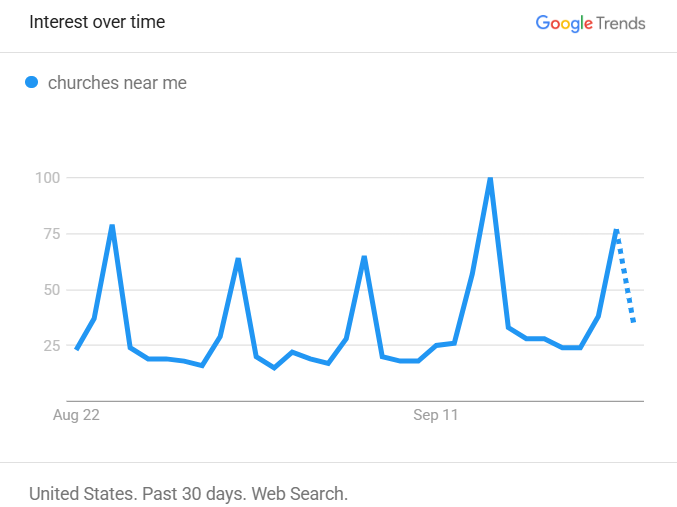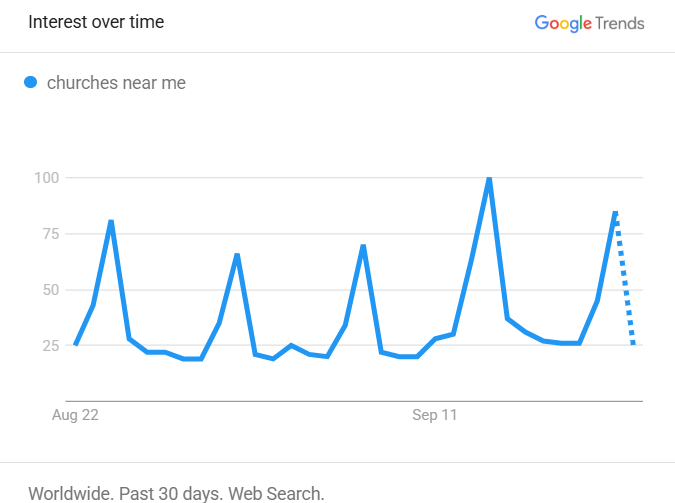Charlie Kirk’s Memorial in Glendale, Arizona, on Sunday put the gospel on full display, with an unparalleled reach of around 95,000 at the stadium and overflow arena, and a reported 100 million people streaming the service. One speaker after another spoke of Kirk’s faith — some plainly sharing the Good News of redemption through the life, death, and resurrection of Jesus Christ. Such presentations of the gospel come amid a clearly growing trend of curiosity toward Christianity and the faith that was central to Kirk’s life and work.
Christian apologist Frank Turek, who mentored Kirk and attended the event at Utah Valley University where Kirk was killed, highlighted the reason for his hope, saying that the reason Kirk is in heaven is “Not because he sacrificed himself for his Savior,” but becasue “his Savior sacrificed Himself for Charlie Kirk.”
At the climax of the service, Kirk’s wife Erika extended forgiveness to the man accused of killing her husband. “That young man — I forgive him. I forgive him because it was what Christ did and is what Charlie would do.”
Prior to the memorial service, churches across the United States, and even internationally, seemed to experience a surge in attendance. Social media platforms were inundated with posts and comments from people saying they had never, or not in many years, attended church, but planned to, inspired by Kirk.
PragerU shared a series of videos from people on social media expressing their newfound interest in going to church or reporting packed Sunday services.
In one of the videos, a woman said she went to church with her family for the first time in her children’s lives. “We are raising three boys that will one day be men, and we want those boys to be as strong in their convictions as Charlie Kirk was.”
“I had to park like five blocks away from church, cause everyone wants to come now,” a man said in another video, “Amen. Thank you, Jesus. Thank you, Charlie.”
The Sunday following Kirk’s death, one X user shared a photo, apparently from a packed church in Florida, saying, “People were standing against the walls and sitting in the stairwells. I am 49 years old and I have never seen anything like this in my life, but I am so thankful to be seeing it.”
Even Google search trends reflected that momentum following the assassination, showing a spike in searches for nearby churches in the United States compared to the previous weeks. While it’s not unusual for this search to spike on Sundays, the Sunday following Kirk’s death showed a significant increase in frequency. The trend was similar in search popularity worldwide.


Christian and conservative podcaster Allie Beth Stuckey, who has hosted Kirk on her podcast, spoken at Turning Point USA events, and appeared on a recent Fox segment with Kirk, discussed the trend and testimonies of people who seem to be seeking God in the wake of his death. “I’ve seen Charlie’s martyred blood water the seeds of revival, and I’ve seen those seeds already begin to take root and sprout up,” Stuckey said. “Charlie’s unflinching boldness for the gospel is not for naught.”
“[W]hat an honor, Charlie,” Stuckey added, “Look at what God allowed your life and death to accomplish. Look at how many people God is bringing to Him because you were obedient. What a testimony.”
Dr. Adam Rasmussen, professor and dean at Arizona Christian University and fellow at The Cultural Research Center at Arizona Christian University, told The Federalist that Kirk’s assassination is a sort of “9/11 moment” for many younger Americans. “They’re experiencing something on a national level that is a tragedy and a call to come back to God,” Rasmussen said.
Rasmussen told The Federalist that he didn’t have the data to speak specifically to church engagement the Sunday after Kirk’s death. But he described what would be necessary to see a real cultural shift. “Lasting change happens through ideas, not feelings … the big problem that we’re having in our culture right now is we don’t have compelling ideas moving us forward.” Rasmussen explained that the foremost of these “compelling ideas” is the gospel.
“For this really to stick, it is not emotion that’s going to win the day. It’s the message of the gospel, which will not change,” Rasmussen said. “What has to change is our response to the gospel. We have to bow the knee to God as our Creator, and we have to bow the knee to God as our Redeemer. We have to say, ‘I want lasting change in my life. I’m no longer autonomous. Jesus is the Lord of my life. He’s my Savior.’ That will change culture.”
Rasmussen stressed the need for active, committed discipleship of people who express interest in Christianity. “If this generation is going to come to understand Jesus Christ as proclaimed in Scripture, a lot of questions are going to have to be answered, and they need to have a safe place to ask those questions,” Rasmussen told The Federalist. “It takes a while to get through those questions, but that’s what discipleship is.”
Dr. George Barna, director of research at the Cultural Research Center, echoed the caution that the hard data to reflect a church attendance trend doesn’t exist at the moment, but acknowledged that the Sunday following Kirk’s death was unique. In a conversation with The Federalist, Barna likewise mentioned the 9/11 attacks and recalled the surge in church attendance that lasted only several weeks.
“I think that’s likely to happen in this case,” Barna commented, “because most churches are not prepared for the surge of individuals coming in with clear and deep questions about purpose and meaning and spirituality and eternity and evil, big questions in life,” Barna told The Federalist. Like Rasmussen, he stressed the importance of personal discipleship — church members on the lookout for newcomers, seeking to befriend them and work through their questions. “Be prepared to recognize somebody who’s a visitor, to go over and speak to them, to welcome them,” Barna said.
Barna told The Federalist that “for the last several decades, politics is what has really been at the forefront of our discussion about identity and purpose and success, and those political discussions clearly have divided the nation.” Kirk’s mission to “bridge the spiritual and political realms, I think, was a lighting rod for our culture,” Barna said, causing listeners to evaluate and discuss more deeply their identities as individuals and as a nation, and to think well about what constitutes success.
“He was trying to show us that, unlike what Senator Tim Kaine said recently in the Senate hearing, God doesn’t report to government, government reports to God,” Barna told The Federalist. “God’s in charge, and so it’s imperative that we recognize the power, the authority, and the sovereignty of God … you’ve got to turn to the one, unchanging source of truth, and that’s God … when we deviate from that, that’s what we get off track.”
A slow increase in openness toward the Christian faith in recent years may have laid the groundwork for such widespread proclamation of the gospel. Data released from Pew earlier this year showed that Christianity’s decline in America, steady for decades past, could be leveling off. Research from the Barna Group highlights what it says “may be the clearest indication of meaningful spiritual renewal in the United States,” with an uptick in commitment to Jesus, particularly among Gen Z and Millennials. The Wall Street Journal also reported on data showing a 22 percent jump in Bible sales in the United States last year.
Kirk said that he wanted “to be remembered for courage for my faith.” In his life, Kirk was known by many for his faith, and in God’s powerful plan, he is remembered by millions more for the gospel in his death. In his speech at the memorial, commentator Benny Johnson paraphrased Genesis 50, saying, “How does it always work? What man intends for evil, God intends for good.”
Catherine Gripp is a graduate of Arizona Christian University where she earned a degree in communication and a minor in political science. She writes for The Federalist as a reporting intern.

















